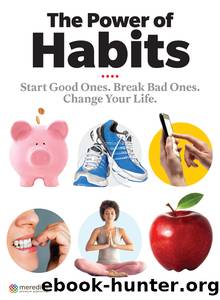The Power of Habits by The Editors of Power

Author:The Editors of Power [The Editors of Power]
Language: eng
Format: epub
Publisher: POWER
Published: 2021-06-22T20:30:00+00:00
Ring Fit Adventure on the Nintendo Switch allows players to defeat enemies, level up and tackle mini-games using real-world, calorie-burning exercises.
Chapter Two
BAD HABITS
Science is showing how habits and addictions are formed in the brainâand how we may be able to change the worst of them
Habits That Are Worse Than Habits
Obsessive-compulsive disorder and behavioral conditions such as compulsive gambling are like habits in some waysâand unlike them in many more
BY RICHARD JEROME
MARK WAS a 30-year-old chemist consumed with the idea that he was being contaminated at the laboratory where he worked. Worse, he was convinced that he was spreading that toxicity around the home that he shared with his wife, Heather, also a scientist. Everywhere he looked, Mark envisioned chemical contaminantsâon trash cans, floors, shoes, in the bathroom and on tabletops. Not that he necessarily thought that he or Heather would contract a disease, but the sense of being tainted, unclean, was overwhelming, fueling a level of anxiety so profound he feared it would cause him physical harm.
To control these feelings, Mark took what he saw as precautionary measuresâavoiding objects that might have touched the floor, showering at least twice a day, washing his hands excessively, scrubbing counters and other surfaces with bleach. At work, he cleaned and recleaned his laboratory instruments and changed his protective gloves more than 30 times a day.
Heather tried her best to accommodate her husbandâs protective rituals. Though she loved to go camping with friends, she knew it provoked crushing anxiety for Mark, so she would make an excuse whenever they received an invitation. Since Mark was certain his contamination spread to the coupleâs shower curtain, Heather changed it weekly. At her husbandâs request, she also took frequent decontamination showers and cleaned household items to keep their home âsafe.â When Heather failed to reassure Mark or follow his hygienic practices, heâd lash out at her. The pressure and tension of enabling her husbandâs routines strained Heather to the point that their marriage was in danger of coming apart. At last, the pair sought counseling.
When treatment began, Mark reported spending more than eight hours a day thinking about contamination and engaging in âprotectiveâ rituals that had become so oppressive that they spilled over into the realm of pathology. These were habitsâbut a pernicious species of habit.
âThe term âcompulsiveâ has lost its meaning in our vernacular,â says clinical psychologist Jon Abramowitz, a professor at the University of North Carolina at Chapel Hill and an authority on obsessive-compulsive disorder (OCD) and anxiety disorders. âMany people refer to any sort of repetitive behavior as compulsive. From a psychological perspective, we primarily think of a compulsive behavior as being part of OCD [if it meets] a very precise definition: itâs a repetitive behavior or thought that is performed in response to an obsessional fear and with the intent of reducing obsessional anxiety or distress.â
This defense mechanism can manifest itself in a variety of forms. Some of the most common compulsions are repeated washing and cleaningâas in Markâs caseâas well as checking
Download
This site does not store any files on its server. We only index and link to content provided by other sites. Please contact the content providers to delete copyright contents if any and email us, we'll remove relevant links or contents immediately.
Effortless by Greg McKeown(1473)
Word Power Made Easy by Norman Lewis(1311)
How to Not Die Alone by Logan Ury(1304)
Beyond Order by Jordan B. Peterson;(1296)
So Good They Can't Ignore You by Cal Newport(1258)
The Power of 100! by Shaun King(1066)
Chatter by Ethan Kross(1061)
100 Things Successful People Do by Nigel Cumberland(1026)
Master of One by Jordan Raynor(1002)
Lives of the Stoics by Ryan Holiday & Stephen Hanselman(965)
Napolean Hill Collection by Napoleon Hill(942)
The High 5 Habit by Mel Robbins(935)
The Art and Science of Results by Joe Vitale(908)
Be Your Best Self by Mike Bayer(886)
Kinesic Magic by Donald Tyson(842)
Friday Forward by Robert Glazer(836)
Career Fear (and how to beat it) by Somi Arian(834)
The 7 Habits on the Go by Stephen R. Covey(821)
The Practice Is the Path by Tias Little(817)
